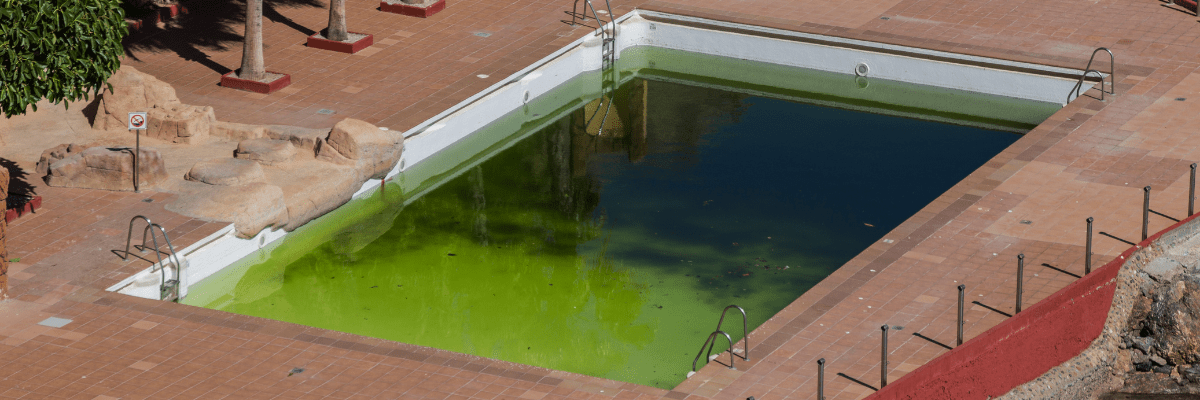Is It Time To Retire Your Pool?

While images of a backyard pool can bring up the feeling of cannonballing into cool water on a hot summer’s day but the reality can be a bit different. The upkeep of a pool is a lot of work, not to mention the cost of chemicals, the water waste, and just the overall cost of electricity.
Here are five reasons why it may be time to retire your pool with Deckover!
Time and Money In Maintenance
You can take care of your pool in about five to 10 hours of your spare time, but don’t forget that you also have to purchase all the supplies: pH kit, chlorine, pool vacuum, pool brushes, filters (replacements), skimmer, pool cover. And right now, the chlorine you need might be hard to find (the shortage of 2020).
Costs for pool vacs can range from $90 for a basic leaf vacuum to a $1700+ Turbo in-ground automatic robotic cleaner. Just wading through the options could give you heartburn. Not to mention the chemical costs just to keep it sparkling blue can range from $30 to hundreds per month.
You can hire a pool service but expect to shell out $125 on average for weekly professional maintenance.
When living where the climate is warm you may be enjoying your pool year-round, but in other parts of the country, there are additional costs for the seasonal shutdown. In addition, you’ll pay higher utility bills when the pool’s in use (summer months) an extra $300 annually for the additional electricity needed to keep working all of the equipment needed.
Safety Concerns
As if you don’t have enough to keep you up at night, there’s this sobering statistic: The Consumer Product Safety Commission’s 2020 data shows that, on average, there are “379 reported pool or spa-related fatal drownings involving children younger than 15 years old each year.” Seventy-five percent of these drownings involve children younger than 5. (1)
There are also possible slip-and-fall injuries and diving board accidents to consider. According to the National Spinal Cord Injury Statistics Center, diving accidents headed the list for recreation-related spinal cord injuries between 2010 and 2017.(1)
There are also the unseen, creepy things that can survive long enough in your pool — even those treated properly with chemicals — to make you sick: cryptosporidium, giardia, shigella, and norovirus which can cause diarrhea, stomach cramps, nausea, vomiting. These are just a few. (1)
High Insurance Rates
You’re responsible for whoever is in your pool, invited or not. Pools are known in the law as an “attractive nuisance,” something tempting to children that might harm them. Just having a fence and/or pool cover isn’t enough.
Your homeowner’s insurance will cover in-ground pool damage with additional fees added to your premium. But when it comes to liability, that “attractive nuisance” adds a much deeper cost layer.
If someone gets injured, you can incur medical and legal expenses. The typical homeowner’s liability insurance policy is $100,000. The Insurance Information Institute suggests raising that to $300,000 to $500,000 if you have a pool. It is also recommended to carry an umbrella liability policy, which kicks in when you reach the limit on your main liability coverage, and it will help pay for attorney’s fees. Yikes, no one likes to hear – ATTORNEY’S FEES!
Wasteful Energy Consumption
The pumps used to circulate water in treated pools and keeping them clean and free of algae are major energy consumers. Pool pumps can consume anywhere 3,000 to over 5,000 kWh per year. In fact, the Energy Information Agency estimated that .9% of all the residential energy used in the United States comes from swimming pools.
Water Waste
While some water evaporation is expected, the chemicals being released into the air surrounding the pool are not. These evaporated chemicals contribute to the production of greenhouse gases.
And now, let’s talk about leaks. It is estimated that 1 in every 5 swimming pools has a small leak and 1 in every 20 pools has a severe leak. What is leaking into the earth below? Chlorine and bromine, both of which are extremely harmful to animals and all of the good things living in the soil and groundwater. OH NO!
If you are ready to find a solution that will save you time, money and peace of mind, we have the answer! Retire your pool with Deckover!
Don’t Fill in Your Pool … Don’t Replaster Your Pool
PARK YOUR POOL with a DECKOVER
Contact us today! Financing is available to all who qualify!
(1) AARP.org

